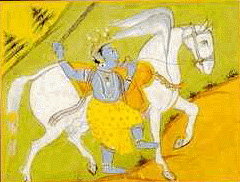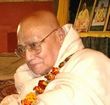

The last avatara among the Dasavatara is Lord Sri Kalki. It is also written that the twenty-fifth and final lila-avatara is Lord Kalki. Generally, these twenty-five avataras appear in every kalpa. That is why they are also known as kalpa-avataras. In his Dasavatara-stotra, Srila Jayadeva Gosvami prays to Lord Kalki in this way:
mleccha-nivaha-nidhane kalayasi karavalamLord Kalki will appear in the home of a religious and highly gentle brahmana, Sri Vishnu Yasa, in a village named Sambhala[1]. The Lord of the universe, Kalkideva, will possess all eight mystic perfections or siddhis such as anima (the ability to become atomically small) and others, as well as an unequalled luster. He will ride on a fast-moving steed and suppress the wicked. The swift horse on which He will ride to suppress the doers of evil will be named Devadatta. While riding on Devadatta, Kalkideva will travel all over the world at great speed, and with His sword He will annihilate countless disguised plunderers and mlecchas who are a burden to the earth. After this, the hearts of all people will become sanctified by the touch of the air carrying the fragrance of sandalwood and other sacred cosmetics decorating Kalkideva. Again, by the desire of Lord Vasudeva, a large number of progeny will take birth. By the appearance of Supreme Lord Kalki, people endowed with the quality of goodness will take birth at the beginning of Satya-yuga.
dhumaketum iva kim api karalam
kesava dhrita-kalki-sarira jaya jagadisa hare
(Sri Jayadeva’s Dasavatara-stotra, 10th Verse)“Lord Kesava assumes the comet-like form of Kalki with a terrible sword to annihilate the wicked barbarians. O Lord of the universe! O Lord Hari! O Lord in the form of Kalki, all glories unto You!”
yada yada hi dharmasya glanir bhavati bharataIn Kali-yuga, when there is a terrible and extensive rise of irreligion leading to an ever-increasing defilement of society, the demigods will take shelter of Lord Vishnu. Understanding the desires of the demigods, the Lord will perform the pastime of appearing in the previously described village of Sambhala and will accept Vishnu Yasa and his wife Sumati as His parents. He will appear on the 12th day of the waxing moon in the month of Vaisakha (April-May). Reaching adulthood, He will annihilate all the mlecchas of the dwelling place of Buddhists, as well as Kuthodevi, the wife of the Rakshasas of Kalkanja, and all other mlecchas. He will even destroy Kali and re-establish dharma.
abhyutthanam adharmasya tadatmanam srijamy ahamparitranaya sadhunam vinasaya ca dushkritam
dharma-samsthapanarthaya sambhavami yuge yuge
(Bhagavad-gita 4.7-8)“Whenever there is a decline of dharma (righteousness) and a prevalence of adharma (unrighteousness), the Supreme Lord appears, millennium after millennium, to deliver the pious and annihilate the dishonest, as well as to re-establish dharma.”
It has also been said that Lord Kalki will obtain the Vedic knowledge from Parasurama and the military science from Lord Siva. The horse on which He will ride while destroying the wicked will be white in colour. In the 1st Canto of Srimad-Bhagavatam, He has been described as the twenty-second avatara.
athasau yuga-sandhyayam dasyu-prayeshu rajasuSupreme Lord Kalkideva saves the living beings from the evil influence of Kali-yuga and re-establishes them in dharma. Such is described in the 6th Canto of Srimad-Bhagavatam:
janita vishnu-yasaso namna kalkir jagat-patih
(Srimad-Bhagavatam 1.3.25)“Thereafter, at the conjunction of the two yugas, when the rulers of the earth have degenerated into plunderers, the Lord of the creation, Jagannatha-Vishnu, will appear as the son of Vishnu Yasa and be renowned by the name ‘Kalki’.”
dvaipayano bhagavan aprabodhad buddhas tu pashanda-gana-pramadatSrila Narahari Thakura has written in his ‘Bhakti-ratnakara’ that those who call themselves God are the disciples of Kali. Their punisher is Lord Kalkideva:
kalkih kaleh kala-malat prapatu dharmavanayoru-kritavatarah
(Srimad-Bhagavatam 6.8.19)“May Supreme Lord Vyasadeva protect me from all kinds of ignorance. May Lord Buddha protect me from activities opposed to the Vedic principles as well as laziness leading to bewilderment and forgetfulness of the Vedic principles of knowledge and ritualistic actions. May Kalkideva, who is considered the supreme descent of Godhead to protect righteousness, protect me from the dirt of the age of Kali.”
se papishtha apanara bolaya ‘gopala’Sri Krishna Dvaipayana Vedavyasa Muni describes the holy biography and glories of Kalkideva in detail in his Kalki Purana:
ataeva tare sabe bolaye ‘siyala’keha kahe - maha amangala e sabara
e saba mlecchera sasta kalki avatara
(Bhakti-ratnakara 14.175-176)“He who declares himself to be God is extremely sinful. All call him a jackal or a cheat. Such dreadful ominous barbarians will be punished by Kalki-avatara.”
sambhale vishnu yasasoKamala Devi (Padma), the beloved of Lord Kalki, will appear from the womb of Kaumudi, the wife of Brihadratha, the king of Simhala. Kalkideva will be four-armed at first, but will later assume a two-armed form at the request of Brahma. Rama, Parasurama, Kripa, Vyasa and Asvatthama will assume the forms of mendicants (bhikshu-deha) to see Kalkideva. Lord Kalki, riding on His horse with sword in hand, will appear in the city of Bhallata with His army. There will be a great battle with the powerful glorious King Sasidhvaja, who will be a devotee of Lord Krishna. Susanta, the wife of Sasidhvaja, will also be a devotee of Lord Hari. In this terrible battle between Kalki and Sasidhvaja, a large number of infantry, cavalry and elephantry will be destroyed. After offering prayers to Kalki, when the devotee Sasidhvaja attacks Supreme Lord Kalki according to the regulations of war, Lord Kalki will faint. Pretending to have fainted, Lord Kalkideva will come with Sasidhvaja to his palace. There, He will accept the worship of Sasidhvaja and his devoted wife, Susanta. At that time, Dharma and Krita-yuga (Satya-yuga) will also arrive there. Due to the repeated and lengthy prayers of Susanta, Lord Kalki will be pleased. He will give up His swoon and stand up like a warrior. At that time, Susanta will be at His front, Krita-yuga at His left side, Dharma at His right side and the great devotee king, Sasidhvaja, at his back.
grihe pradurbhavabamyaham
sumatyam matari vibho
kanyayam tvannidesatahcaturbhir bhratribhirdeva
karishyami kali-kshayam
bhavanto bandhava devah
svamsenavatarishyatha
(Kalki Purana 2.4-5)“Sri Hari said to the lotus-born Brahma, ‘At your request, I shall take birth on the earth in the home of the brahmana, Vishnu Yasa, from the womb of his wife, Sumati. I shall destroy Kali with My four brothers. O demigods! You should also take birth on your behalf and establish friendly relations with Me for the benefit of the inhabitants of heaven.’ ”
King Sasidhvaja will call his sons and according to the desire of his wife, he will surrender his daughter Rama to the lotus feet of Lord Kalkideva. Kalki Purana describes how King Sasidhvaja became a devotee.
Sasidhvaja and his wife had formerly been born as foul smelling flesh-eating eagles. A hunter had trapped them in a net and brought them to the bank of the River Ganga. There he pulverised their heads by striking them on a black stone found in the river Gandaki (which are representations of Vishnu called salagrama sila) and killed them. Since they had departed from their bodies on a holy salagrama-sila marked with a cakra on the bank of the Ganga, they assumed four-armed forms and went to Vaikuntha-dhama. After living there for one hundred yugas they came to the abode of Brahma, where they lived for five hundred yugas and then lived four hundred years in paradise. After this, they attained human births as devotees of Lord Hari.
A detailed description of Kalkideva along with the gist of subjects and incidents has been described in Kalki Purana as follows:
The conversation between Suka and Markandeya Muni; a description of the Adharma dynasty; a description of Kali; the journey of the earth in the form of a cow along with the demigods to the abode of Brahma; the birth of Hari in the home of Vishnu Yasa according to the promise of Brahma; the birth of four brothers as partial manifestations of Sri Hari from the womb of Sumati in Sambhala village; the conversation between father and son; Kalki accepts the sacred thread; the father and son live together; Kalki learns the Vedas and military science; the meeting with Lord Siva; Kalki prays to, and receives boons from Lord Siva; Kalki obtains the company of Sukadeva; Kalki returns to Sambhala village and describes the boons of Lord Siva to His relatives; at the request of King Visakhayupa, Kalki describes His own form; the glories of the brahmanas; the arrival of Suka; the conversation between Kalki and Suka; Suka describes Simhala; by the boon of Hara-Mahadeva, the kings become women just by seeing Padma at her svayamvara; Padma’s sorrow; Kalki’s attempt at marriage; Suka is motivated to be a messenger; the mutual introduction of Suka with Padma; the method of worship of Hari; meditation on Lord Hari from His feet to His face; Padma gives her ornaments to Suka; Suka again meets with Kalki; Kalki sets off to marry Padma; the meeting with Padma by the deception of water-sports and then marriage; the kings regain their masculinity just by seeing Kalki; the arrival of Ananta; Ananta’s discussion with the kings in the assembly; a description of Ananta’s birth as a eunuch; prayers to Lord Siva; Ananta’s father passes away seeing maya in Vishnu-kshetra; the biography of Ananta; Ananta’s knowledge, renunciation and so on; the departure of the kings; Kalki goes to Sambhala with Padma; Visvakarma builds a city in Sambhala; Kalki, together with Padma, His relatives and His armies, resides in the house built by Visvakarma; suppression of the Buddhists; the Buddhist women travel to the battlefield; the presence of the sages named Balakhilya; self-dedication; the killing of the Rakshasi Kuthodevi along with her sons; the sages meet with Kalki in Haridvara; a description of the lunar and solar dynasties; the holy life of Lord Rama; the meeting with Maru and Devapi who had come for battle; the killing of the violent Kokavikoka; Kalki goes to Bhallata city; the battle with Sayakarna and others; Kalki’s battle with King Sasidhvaja; the devotion of Susanta; Kalki brings Dharma and Krita-yuga from the battlefield; Susanta prays to Kalki; Kalki’s marriage to Rama; a description of Sasidhvaja’s previous life in the assembly; the reason for his becoming old; Sasidhvaja obtains liberation from Kalki; deliverance of the visha-kanya; coronation of the kings; prayers by maya; various sacrifices in Sambhala village; Vishnu Yasa is liberated by Narada; the nature of Krita-yuga and dharma; the vow undertaken by Rukmini; Kalki’s wanderings; the birth of Kalki’s sons and grandsons; the presence of demigods and Gandharvas in Sambhala village and after this, the departure of Kalki to Vaikuntha.
---From "Dasavatara - The Ten Manifestations of God" by Swami B.B. Tirtha.
![[BVML Home Page]](../grfx/bml_logo.gif)
